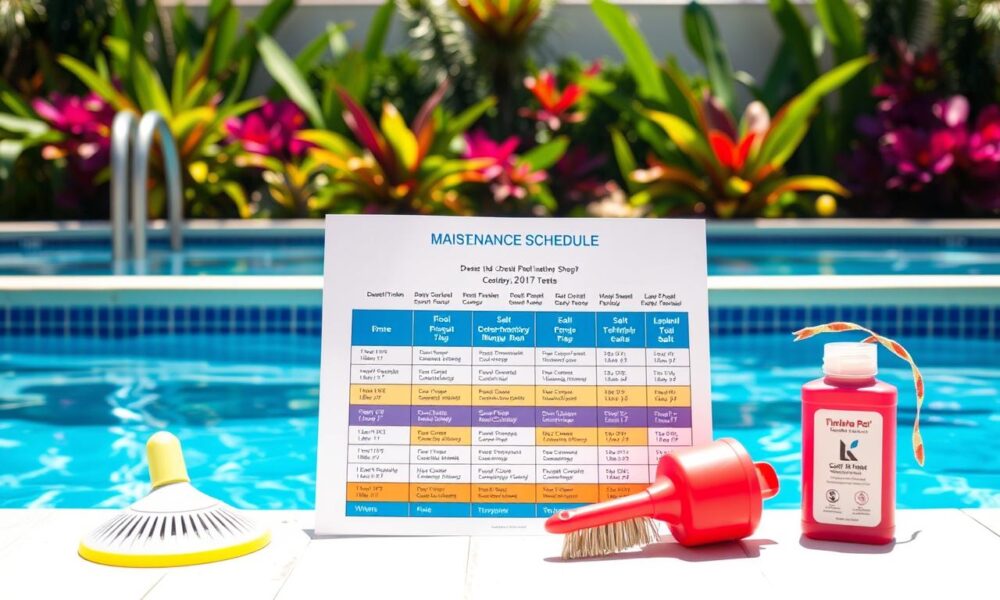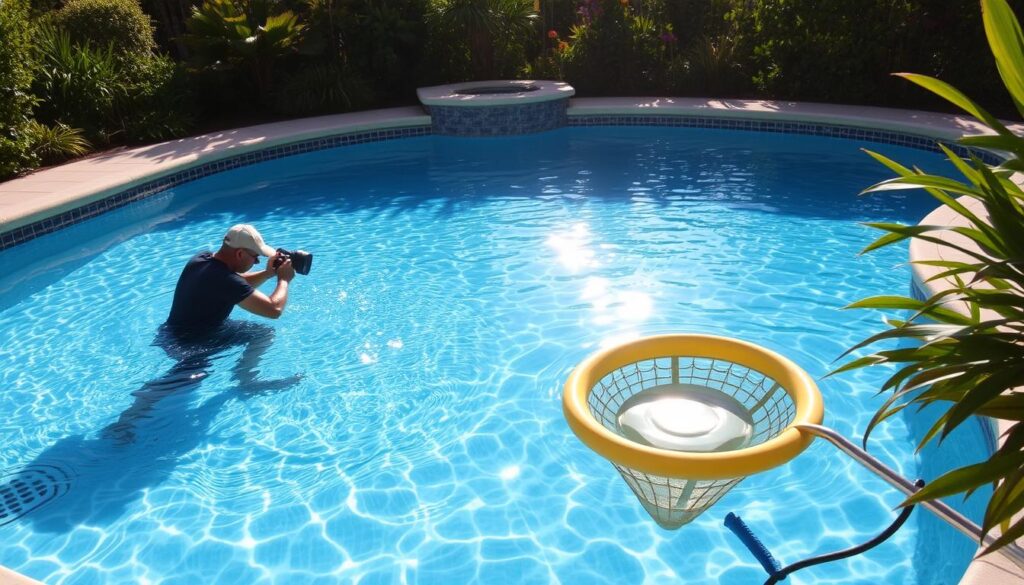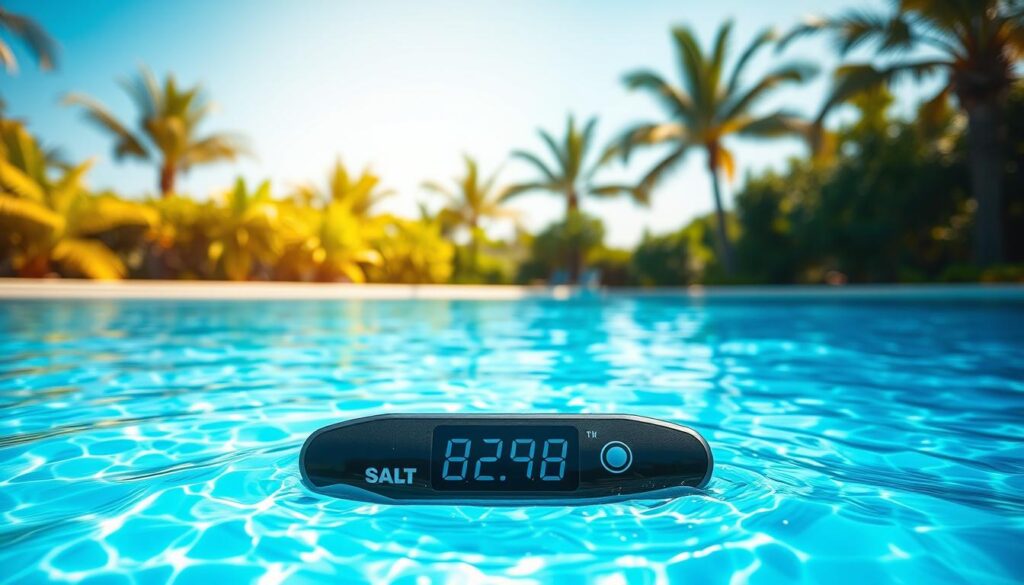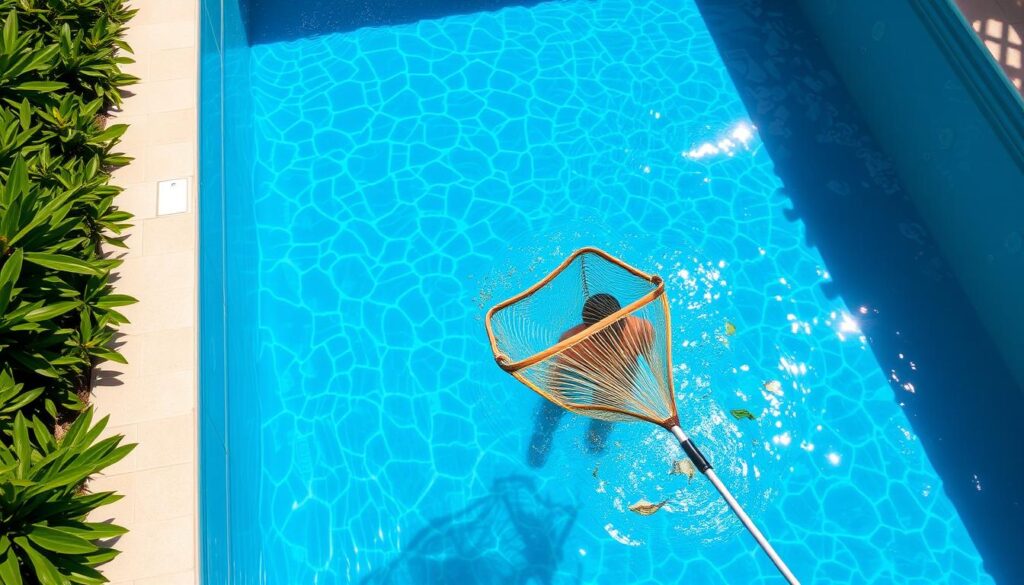
Salt Water Pool Maintenance: Keep Your Pool Sparkling
Maintaining a salt water pool might seem challenging, but it’s actually more straightforward than traditional chlorine pools. This comprehensive guide will walk you through the essential steps of salt water pool maintenance, from monitoring salt levels to optimizing your chlorine generator. You’ll discover how to manage your pool’s chemistry, perform routine cleaning, and keep your salt water system operating at peak efficiency for crystal-clear water all season long.
If you’re new to salt water pools or want to improve your care routine, this article is for you. You’ll find tips on fixing common problems like algae and cloudy water. This way, your pool will stay a cool spot all summer.

Key Takeaways
- Understand the benefits and workings of a salt water pool system
- Establish an essential salt water pool maintenance routine
- Monitor and adjust salt levels to maintain the ideal balance
- Effectively clean and skim your salt water pool to remove debris
- Shock and balance your pool’s chemistry for optimal performance
Understanding Salt Water Pool Systems
Salt water pools are gaining popularity fast. They offer many benefits over traditional pools. At the core of these systems is the salt water generator. It uses electrolysis to turn salt into chlorine, making the water gentler and more natural.
What is a Salt Water Pool?
A salt water pool uses a system to keep the water clean. It doesn’t use harsh chlorine. Instead, it turns salt into a mild form of chlorine through electrolysis. This chlorine keeps the water clean and clear, without the strong smell or irritation of traditional pools.
Benefits of Salt Water Pools
- Softer, more natural water: Salt water pools offer a gentler swimming experience. The water feels silkier and is less harsh on skin and eyes.
- Reduced chemical use: The system generates chlorine continuously. This means less need for manual chlorine additions and other chemicals.
- Lower maintenance costs: With fewer chemicals needed, salt water pools can save money over time. They are more cost-effective than traditional pools.
Understanding how salt water pool systems work and their benefits helps homeowners decide. They can see if a salt water pool fits their needs and lifestyle.
Essential Salt Water Pool Maintenance Routine
Keeping a salt water pool clean and balanced is key. A regular maintenance schedule is crucial. It ensures your pool is always ready for a refreshing swim. Let’s explore the must-do tasks for your salt water pool maintenance schedule.
Daily Pool Maintenance Tasks
Begin each day by skimming the pool surface. This removes leaves, twigs, and insects. It stops contaminants from spoiling your pool’s chemistry. Also, check the chlorine and pH levels and adjust them if necessary.
Weekly Pool Care Checklist
- Brush the walls and floor to remove algae or debris.
- Vacuum the pool to get rid of dirt or debris.
- Clean the pool filter as the manufacturer suggests.
- Test and adjust the alkalinity and calcium hardness levels.
These weekly pool maintenance tasks keep your salt water pool clean and balanced.
Monthly Maintenance Considerations
- Check and clean the pool equipment, like the pump and filter.
- Shock the pool with a high-chlorine treatment to kill bacteria.
- Do a detailed water test to fix any chemistry imbalances.
By sticking to this salt water pool maintenance schedule, your pool will always be ready for fun. It will be a clean and welcoming space for you and your family.
Monitoring and Adjusting Salt Levels
Keeping the right salt concentration is key for your salt water pool’s health. You need to check and adjust the salt levels often. This ensures your pool stays in the best condition.
Ideal Salt Level Range
The perfect salt level for a salt water pool is between 2,500 and 3,500 parts per million (ppm). This range helps the chlorine generator work well. It also keeps the water soft and safe for swimmers.
Signs of Imbalanced Salt Levels
When salt levels are off, you’ll see some signs:
- High salt levels: Too much salt makes the water taste bad. It can also irritate skin and eyes and damage pool equipment.
- Low salt levels: Not enough salt means less chlorine. This can lead to dirty water and more algae.
To keep your pool perfect, test the water often and adjust as needed. Regular maintenance ensures your pool stays clean and inviting all season.

Cleaning and Skimming Your Salt Water Pool
Keeping your salt water pool clean is key for its look and water quality. Regular cleaning and skimming are essential. They help remove debris and contaminants, making your pool inviting.
Removing Debris and Contaminants
It’s important to keep your salt water pool free of debris. Skimming the surface with a net or pool skimmer catches floating leaves and twigs. Brushing the walls and floor weekly also helps remove algae and contaminants.
To keep your salt water pool fresh and clean, follow these steps:
- Skim the surface daily to remove floating debris
- Brush the walls and floor of the pool once a week
- Vacuum the pool regularly to suction up any settled salt water pool cleaning debris
- Clean the pool filter as per the manufacturer’s instructions to maintain optimal water circulation and filtration
By sticking to these pool skimming cleaning routines, your salt water pool will stay sparkling all season.

Shocking and Balancing Pool Chemistry
Keeping your salt water pool perfect is more than just salt levels. You must also watch the pool’s chemistry balance. This is where shocking and balancing the water comes in.
Shocking your salt water pool is key to keeping it clean. You add a lot of chlorine or other agents to kill bacteria, algae, and organic matter. This makes sure the pH and alkalinity levels are just right, making the pool healthy and inviting.
After shocking, test and adjust the chemical balance. Check and keep the pH and alkalinity levels right. This stops scale buildup, corrosion, and other issues that harm your salt water pool.
A balanced salt water pool looks great and is safer for swimmers. Regularly shocking the pool and keeping the pH and alkalinity right keeps it in top shape. This gives you and your family a fun and refreshing swim all season.
Salt Water Pool Maintenance: Maintaining Pool Equipment
To keep your salt water pool perfect, you need to do more than check the water chemistry and clean the surface. It’s also key to take care of the pool equipment like filters and pumps. This ensures your system works well and lasts longer.
Cleaning and Replacing Filters
Your pool’s filter is vital. It catches dirt, debris, and contaminants to keep the water clean. Cleaning it regularly is a must. You might need to do this every few weeks or monthly, depending on how much you use it and the pool’s size. Check your manufacturer’s guide for the best cleaning schedule and methods for your filter.
Also, don’t forget to replace your filter media when it’s time. Sand, cartridge, and D.E. filters all have a lifespan. They need to be replaced every few years for the best filtration. If you ignore this, your pool’s water flow and pressure might suffer, making it less clear.
Inspecting and Servicing Pumps
- It’s crucial to regularly check your salt water pool’s pump for salt water pool equipment maintenance.
- Look for any wear or damage, like cracks, leaks, or odd noises.
- Make sure to clean the pump basket often to avoid clogs and ensure cleaning pool filters works well.
- Follow the manufacturer’s advice to lubricate the pump’s parts and prevent wear.
- If the pump needs more serious work or repair, get a professional pool technician to do it right.
By focusing on your salt water pool’s filters and pumps, you can keep your system in top shape. Regular care for these parts will help your pool stay a beautiful spot for many years.
Troubleshooting Common Salt Water Pool Issues
Even the most well-kept salt water pools can face problems. We’ll look at two big issues: salt water pool algae and cloudy salt water pool. We’ll share easy fixes to keep your pool clean and clear.
Dealing with Algae Growth
Algae in salt water pools can cause ugly problems. It can make the water look bad and feel slimy. To fight salt water pool algae, keep up with your pool care:
- Brush the pool walls and floor often to remove algae.
- Use a high-chlorine shock treatment to kill off algae.
- Make sure your pool’s chemicals, like pH and chlorine, are just right.
Addressing Cloudy Water
Cloudy water in salt pools is a big nuisance. But, there are ways to make it clear again:
- Check and clean or replace your filter.
- Shock the pool with a high-chlorine treatment to get rid of contaminants.
- Use a pool clarifier to remove small particles causing the cloudiness.
By tackling these common salt water pool issues early, you can keep your pool looking great. Enjoy a clean, clear pool all season.
Professional Salt Water Pool Maintenance Services
Keeping a salt water pool clean can be hard, especially for big or complex pools. Luckily, professional pool maintenance services can make it easy. They ensure your pool stays clean and balanced.
By choosing a professional pool maintenance company, you get expert care without doing the work. These skilled technicians know how to keep your pool running smoothly. They make sure it stays inviting for years.
Some key benefits of professional pool care are:
- Deep cleaning and skimming to remove dirt and harmful stuff
- Checking and adjusting salt levels for the perfect balance
- Regular shocking and chemical balancing for clear water
- Keeping pool equipment like filters and pumps in top shape
- Quick fixing of problems like algae or cloudy water
When hiring a pool maintenance company, pick one with a good reputation. Look for companies with experienced techs, a reliable schedule, and high-quality products. Professional pool maintenance services mean a clean, hassle-free pool all season.
Conclusion
We’ve looked into salt water pool maintenance and found the key steps to keep your pool clean and inviting. You now know how to keep your pool water perfect. This includes understanding the benefits of salt water systems and how to adjust salt levels.
Remember, a regular maintenance routine is crucial. Clean your pool well and keep the chemistry balanced. This way, your pool equipment lasts longer, and swimming becomes a joy.
Now, it’s time to put these tips into action. Make salt water pool care a part of your routine. If you need help or have questions, Friendswood Custom Pools is ready to assist. Contact us for a free consultation and let’s make your pool perfect.
FAQ
What is a salt water pool?
A salt water pool uses a special system to make chlorine from salt. This makes the water softer and gentler than traditional pools.
What are the benefits of a salt water pool?
Salt water pools have softer water and use less chemicals. They also cost less to maintain over time. Plus, they need less shocking and have a stable pH balance.
How do I maintain the proper salt levels in my pool?
Keep salt levels between 2,500-4,500 ppm. Test the water often and add salt as needed to stay in the right range.
How often should I clean and skim my salt water pool?
Skim the pool daily to remove debris. Clean the pool walls and vacuum the bottom weekly for best results.
When and how should I shock my salt water pool?
Shocking the pool is key for keeping it clean. Do it once a week or after lots of swimmers to kill bacteria and oxidize organic matter.
What are some common issues I might face with a salt water pool?
Issues like algae and cloudy water are common. Algae can come from bad chemical balance or poor circulation. Cloudy water might be from too much cyanuric acid or bad filtration.
When should I consider hiring a professional pool maintenance service?
If you have a big or complex pool, or if you don’t want to do maintenance yourself, consider a professional. They can keep your pool in top shape and fix problems fast.

